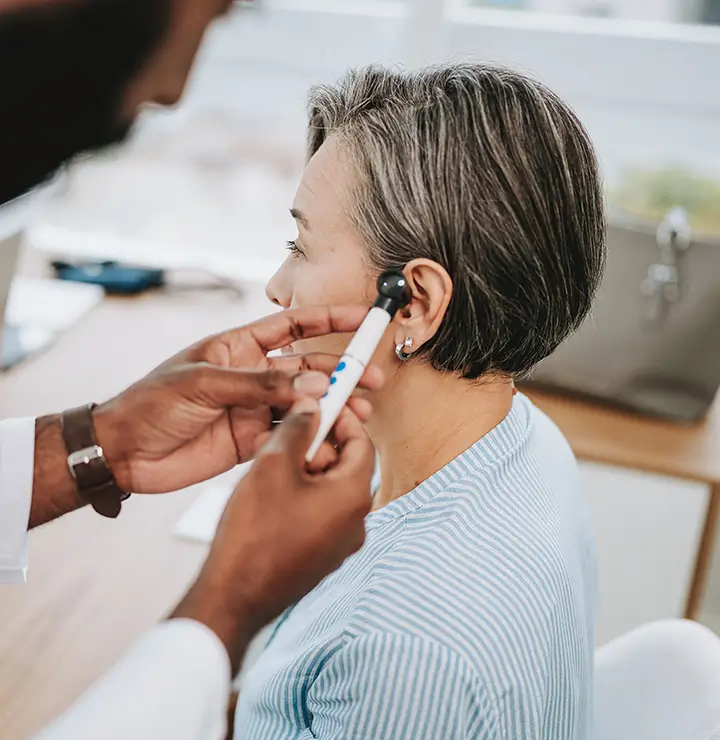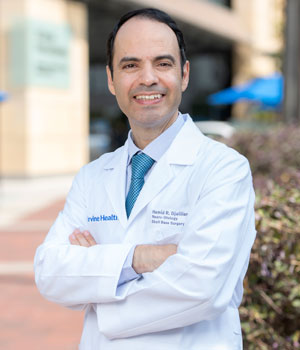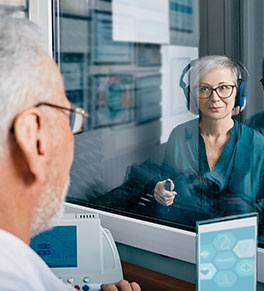Audiology Center
When you struggle to hear what those around you are saying, it can be isolating and frustrating. These difficulties can even lead to depression.
You don’t have to continue to struggle to understand what others are saying or to ask your loved ones to repeat themselves.
The UCI Health Audiology Center provides a full range of diagnostic services for patients of all ages who are experiencing hearing problems. We offer the services of audiologists, who work in close collaboration with our ear, nose and throat specialists, to determine the proper treatment for hearing loss.
We also offer the latest in hearing aid technology, as well as implantable devices for severe hearing loss and deafness.
For more information, call the UCI Health Audiology Center specialists at 714-456-7017 or request an appointment online.
Looking for more options?
View all clinicians
Testing
To identify the nature and severity of hearing loss, a series of tests must be conducted before a course of treatment can be developed.
The many services we provide at the UCI Health Audiology Center include:
- Pure-tone audiometry testing. These screenings are conducted in a special soundproof room, ensuring that background noise does not interfere with the test. The results are compiled in a graph called an audiogram.
- Speech testing. Speech testing can help determine your speech reception threshold—that is, the quietest sound that can be heard. The audiologist assesses how loud speech must be for you to recognize words.
- Auditory brain stem response evaluation. This test assesses hearing in infants and young children who aren’t yet talking.
- Tympanometry. Tympanometry assesses middle-ear function, including detecting fluid in the middle ear or a torn or punctured eardrum.
- Electronstagmography. Electronstagmography can help determine whether inner ear disorders are contributing to dizziness or vertigo.
- Hearing aid evaluations. Hearing aid evaluations help patients select the most appropriate hearing aid. These evaluations take into account the patient’s test results, type of hearing loss, preferences and special needs. Audiologists custom-fit devices to ensure that patients have optimum comfort and function.
- Audiologic rehabilitation. Audiologic rehabilitation helps patients with severe hearing impairment relearn how to cope with sound once they receive a hearing aid or cochlear implant. Rehabilitation also helps patients learn how to improve their listening and communication skills.
Hearing Aids
Treatment for hearing loss is usually a hearing aid. However, just one in five people who could benefit from hearing aids actually use them, according to the National Institutes of Health.
After you are tested by our experts at the UCI Health Audiology Center, we discuss your available options.
Hearing aid types
Many types of hearing aids are available today. While they do not eliminate all problems that hearing loss can create—or bring back normal hearing—hearing aids can improve communication difficulties.
Custom hearing aids come in three basic sizes:
- Completely in the canal, or CIC. These are the smallest hearing aids available. They require dexterity to insert and remove, and to change the battery.
- In the canal, or ITC. This type of hearing aid sits at the bottom portion of the outer ear. ITC instruments allow for programming flexibility, so your hearing aid can give you hearing assistance where you need it most.
- In the ear, or ITE. These hearing aids are larger and don’t require as much dexterity to insert or remove.
Non-custom hearing aids are worn behind the ear (BTE). These hearing aids are attached to the ear with a custom mold or non-custom tubing.
Learn more about hearing aid types
Adjustment period
A hearing aid requires several weeks of adjustment, which should be followed by continued improvement and satisfaction over the next several months.
We provide all types of hearing aids. Our audiologists will work with you to determine which hearing aid best fits your lifestyle, budget and needs.
If you would like to discuss getting fitted for a hearing aid, call us for an evaluation at 714-456-7017.
Implantable Devices
When a patient cannot hear, or their hearing loss is so great that hearing aids are not enough, our specialists may recommend an implantable device.
One type of implant is called a bone-anchored hearing aid (BAHA). The U.S. Food and Drug Administration approved its use for conductive and mixed hearing loss in 1996. In 2002, the FDA extended that approval for its use with deafness in one ear.
We use BAHA to improve hearing in patients whose hearing has been impaired by:
- Chronic ear infections
- Congenital external auditory canal atresia (when the ear canal does not develop)
- One-sided deafness that isn't helped by a regular hearing aid
Learn more about how bone-anchored hearing aids work
Cochlear implants can help people who are deaf or have severe to profound sensorineural hearing loss in both ears. These devices have been implanted in more than 40,000 adults and 28,000 children in the United States.
Sensorineural hearing loss, also called nerve deafness, can result from illness, head trauma, malformation of the inner ear, exposure to loud noise and general aging. For these individuals, even the most advanced hearing aids transmit distorted sounds, like listening to music through a bad speaker.
While a cochlear implant does not restore normal hearing, it transmits sound waves directly to the auditory nerve, providing a useful representation of sound that can help the recipient understand speech.
Learn more about how cochlear implants work
Our Team
The UCI Health Audiology Center is staffed by hearing and ear disorder specialists and audiologists.
Audiologists are licensed professionals who are trained to evaluate hearing loss using sophisticated diagnostic equipment and methods.
Our audiologists have master's or doctoral degrees in their specialty area, as well as extensive training in evaluating hearing and balance disorders. They are qualified to perform hearing tests on infants, children and adults. They also are experienced in fitting patients for hearing aids.
Our audiologists also work with our ear specialists to evaluate patients with severe hearing loss for cochlear implants and bone-anchored hearing aids, as well as other treatments.
Featured News Stories

Ophthalmology
01-29-2026
Newly opened UCI Health — Brea Outpatient Center increases access to academic-focused care
Residents in north Orange County can now benefit from expanded advanced eye care, along with ear, nose and throat services.
08-12-2025
Tinnitus: A lesser-known menopause symptom
IN THE NEWS: Fluctuating estrogen levels alter how the brain and auditory system process sound, says UCI Health otolaryngologist Dr. Hamid Djalilian.
06-12-2025
Defining optimal strategies for skull base reconstruction
UCI Health rhinologist Dr. Edward C. Kuan leads a global team of experts to refine and elevate care.
Featured Blog Posts
09-12-2025
The surprising link between menopause and tinnitus
Nearly a third of menopausal women may experience new or worsening symptoms of the hearing disorder.
04-25-2025
HPV-related oral cancers soar among men
But these cancers of the throat, tonsils and tongue, caused by the human papilloma virus. are highly treatable when caught early.
11-25-2024
Heartburn vs GERD: What's the difference?
Gastroesophageal reflux disease is a chronic condition that puts people at greater risk for developing more serious conditions, including esophageal cancer.











